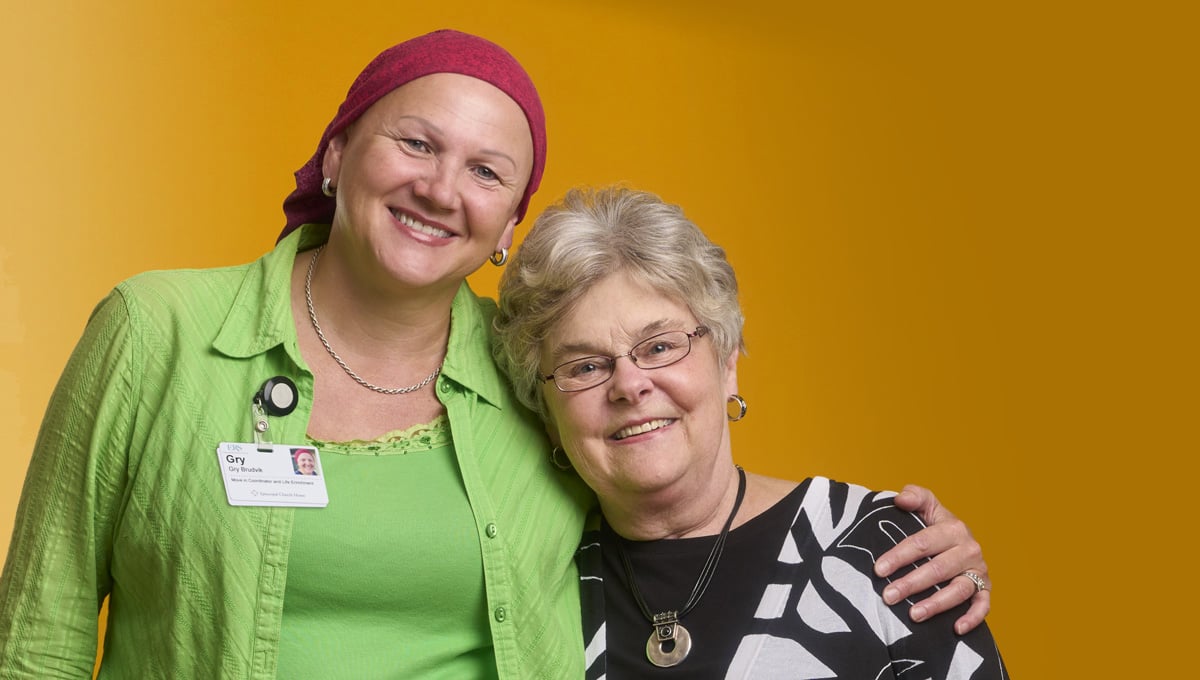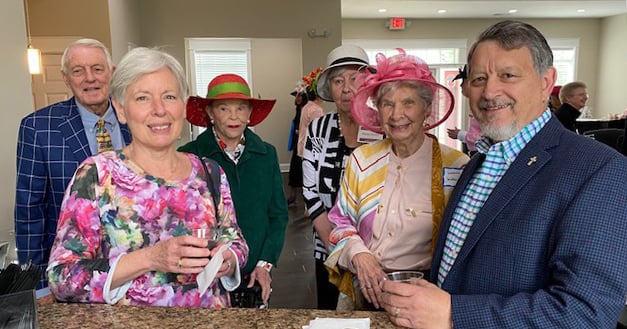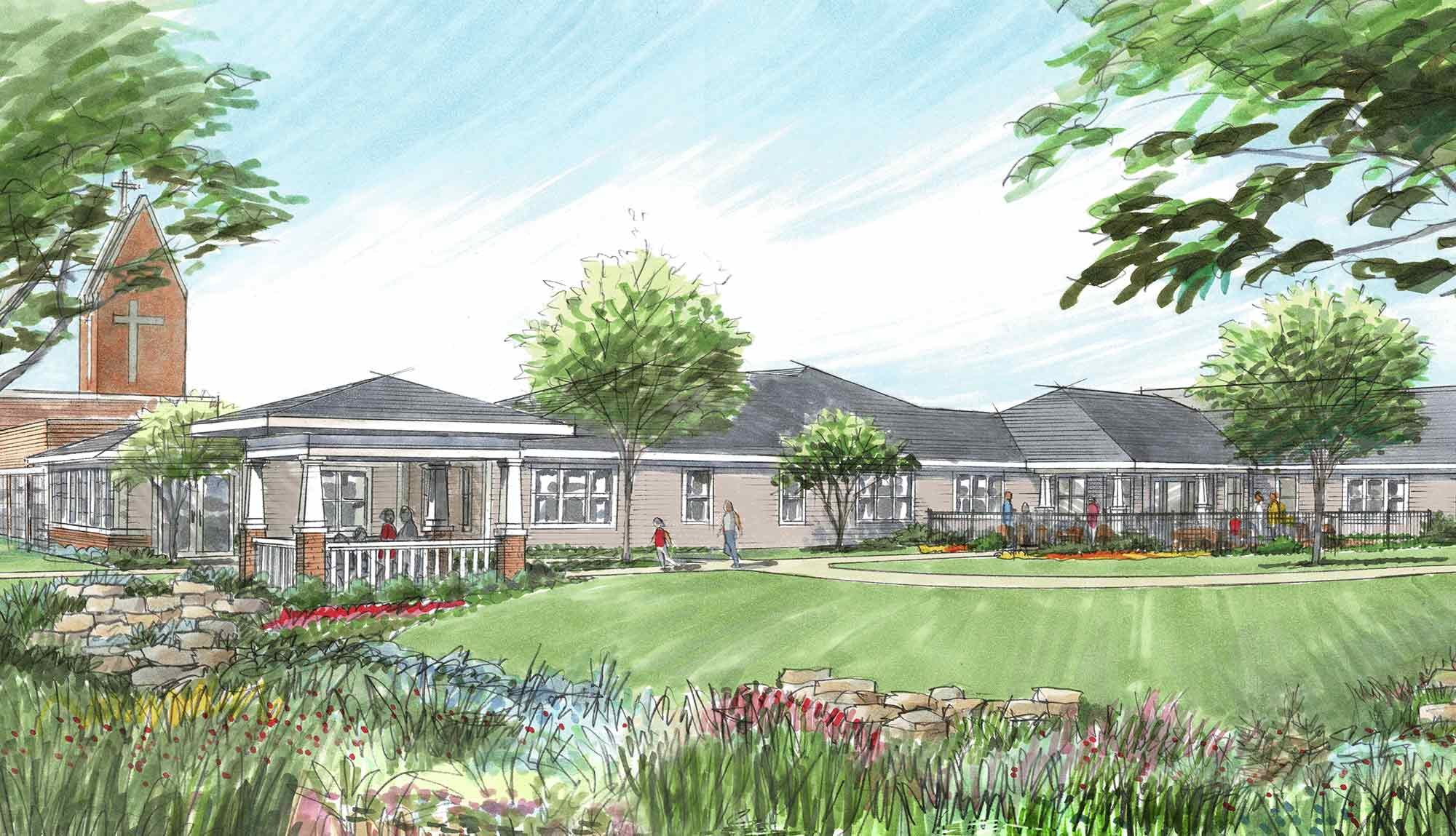 Gry Seymour and Dudley Square resident Sally Jackson.
Gry Seymour and Dudley Square resident Sally Jackson.
Gry Seymour has worked at Episcopal Church Home for about nine months and has helped build a greater sense of community since her arrival, which coincided with the opening of a new clubhouse on the senior-living campus, and some loosening of physical-distancing restrictions prompted by the COVID-19 pandemic. An energetic ‘people person,’ Gry is enjoying her new friends. By the way, her name is pronounced GREE, which rhymes with the tree, and means “dawn” in Norwegian. Here’s our interview with her.
Q. Tell us about your new role here at Episcopal Church Home.
A. I have been working here for about nine months, and I have many responsibilities. I am the move-in coordinator. I am the life-enrichment coordinator for Dudley Square, our Independent Living patio homes, and the admissions coordinator for the Morton House memory-care neighborhoods.
What did you do before this?
I did very much the same thing in a retirement community in Pennsylvania. I was the move-in coordinator at a not-for-profit in Lancaster County, Pa.
You’re from Norway....
I am originally from Norway, yes. I was born and raised in Norway. As of this year, I’m a Norwegian-American because I got my American citizenship this year after 30 years, and I have dual citizenship. My ceremony was this spring. That was very special. It was quite unique. I have always considered myself a Norwegian in my soul, and that’s a deep-rooted thing in terms of where you grew up and where you feel you come from. And even though I have now lived longer in the states than in Norway, I still always felt like a Norwegian, and Norway was not able to offer dual citizenship until just a couple of years ago. So then I thought, I believe it’s time. This country has become my home, and I really belong in both places. I feel connected and loved in both countries.
What’s the best thing about Norway?
The nature. The mountains. The fjords. Not the weather, necessarily, but the mountains. I deeply miss the mountains. That’s what I miss the most about Norway. And here in Kentucky, we don’t have anything like that.
Where in Norway did you grow up?
I grew up in Bergen, on the southwest coast, the second-largest city in Norway.
That’s near the fjords, right?
It’s called the Gateway of the Fjords. For the tourists. All the cruise ships dock there. It’s on the coast.
What do you like most about the United States?
How diverse it is in terms of nature. You have the East Coast, you have the West Coast. You have the north and the south. And I have been to 49 out of the 50 states. It is just so vast and impressive. And for me, it has been very welcoming.
What’s the 50th state?
Alaska. I’ll get there at some point. My husband, John, an American, has been to all 50 states, which is not common among Americans, I am learning. Not everybody travels. John is from Louisiana, so the joke is that a Cajun and a Viking walk into a bar…. But we haven’t developed it beyond that.
As the move-in coordinator, what advice do you give to people moving into a senior community?
Usually, people who come here will downsize. So they’re coming from a large home to a smaller home, and they have a lot of belongings. And it’s hard for them to get rid of some of these belongings, but what I often advise them is that it is a very healthy process to purge yourself of a number of your things. And very often, people are delighted when they can do so to reduce the number of objects that they own.
Any advice for what they should keep?
Well, that can be different for different people. The essentials, furniture, bedding, couches, sofas, and it’s so individual, because what is essential to one person…. How does it go? One person’s trash is another person’s treasure. A lot of people have knick-knacks, and some people have a lot of books.
What do you most enjoy about working at Episcopal Church Home?
The people. I am a people person. I love creating relationships. I love to support people, but just get to know people and have relationships. That has always been my forte, part of my skills. I am absolutely a people person, so my colleagues and the residents are the main reason I am here every day. And I look forward to Mondays. I do not say, ‘Thank God it’s Friday.’
I look forward to Mondays.
How do you use those skills here to build community?
A sense of trust creates a sense of belonging, that people are part of the social environment, a community where people care about each other and have fun. This isn’t a place where old people come to live. This is a place where people who are in their older years are coming to continue living and doing fun things, educational things. Things that matter.
What are some of the best things for quality of life for people at Dudley Square?
Oh, the social aspect. Absolutely. Even at an older age – we’re talking people in their 70s, 80s, and 90s – can still have their autonomy and be independent. For some people, it’s to a certain level. They might need help or care. But they can continue living a meaningful, autonomous life, regardless of being up in age. And, I think also, safety, for many people. It’s important for them to know that if something happens to them or their house, we are just a phone call away. So there is a sense of safety.
Tell me about activities in the clubhouse, which just opened in the fall of 2021. How has that helped build community?
it is a space for people to gather. Again, I’m coming back to the social aspect. People can be together, especially now, as we are still amid the pandemic. Before that was opened, due to the pandemic, people were very isolated in their homes. Even though they lived next to each other, they were still isolated. The clubhouse is a central meeting point, hopefully, the heart of Dudley – the beating pulse and heart of Dudley – where people can come and go, where I have my office, and where people can come for advice, for help, for clubs, for dinners, for parties. But it is a point of gathering, creating community together. And I think that’s very important. Dudley has never had that before. I think it was fortuitous that Dudley opened around the same time as I entered the scene. So together, those two components – a person they could go to, and talk to, and get help from, or party with, for that matter – together with a place, I think those two things were important.

The Clubhouse at Dudley Square provides a perfect place for residents to gather and celebrate occasions like the 148th running of the Kentucky Derby.
What are some of the more fun activities that have happened since the clubhouse opened?
We had, for the first time, in Dudley, an official Derby party. That was lovely. That was fun. A lot of the ladies brought their beautiful hats and their fascinators. We have had movie nights, which in some ways is a passive activity. But people come together wanting to see movies. We have popcorn and wine, and again, the idea of gathering together. We have gone on several outings and trips to museums. We went to the Van Gogh exhibit in Louisville. We had two days with a bus full of people. I arranged that, and that was a great success. It was an immersive experience. Anywhere from trips to my little exercise group that I teach every Wednesday morning at 11. I have a handful – it happens to be ladies – who dutifully come, and we exercise together. There’s a conversation group I facilitate every Monday at 3 p.m., where also a handful of residents get together. It’s mostly men in that group, so it’s interesting. It’s the same group of people who’ve come since December since I started it. And my idea was, again, to create community by coming together, talking about ourselves, getting to know ourselves and each other, and building a stronger connection with people. We have discussed anything from politics to marriage, to being a widower, to our grandchildren, to our professional life. It’s been exactly what I had in mind when I started that group.
Is it exclusively men?
It used to be three men and one woman. Now we have two ladies, but three men, in particular, come every time, and I think they’re comfortable with me, and they enjoy conversing, and they have a lot to say. They come from both sides of the table in many matters, and they come back every week.
How has the sense of community changed in the time you’ve been here, factoring in COVID-19 and everything?
I do feel that people are happier and more content. Fewer complaints about life in COVID. And the feedback I get is they enjoy the things I do. They enjoy me and my personality. And they enjoy getting together, and they want to live here, and they enjoy living here.
That’s got to be gratifying that they enjoy your personality, right? Not surprising, but…
Absolutely. That means everything to me that what I do matters, and they enjoy me and my personality. And that’s part of it. That means the world to me. And I know that I’m in the right place, doing the right things.
For people who live in Dudley, what are some things outside ECH, nearby, etc., that add to their quality of life?
From a physical aspect, we have Westport Village, which is just across the street and has several restaurants, shops, and stores, and they can just walk across the street. Many people in Dudley come from Louisville. So they have lives outside the community, as well. They are not dependent on what happens at Dudley to have a rich social life or a rich spiritual life. They belong to churches, communities, book clubs, and bridge clubs. We have five different bridge clubs in the community – one that meets regularly in the clubhouse. We have three to five book clubs, two of which meet in the clubhouse. I think the fact they can combine life in Dudley and their former life in the local Louisville area I think that’s important for people. I know some residents moved from outside of Louisville, but it’s a very small percentage.
How do you determine what kinds of activities you have?
We have tried to get a committee together to work with me. It hasn’t gotten off yet. In the beginning, I tapped into the experience I had doing activities in other communities, and I tried to get a sense of what they wanted to do. And they also took great initiative, telling me, ‘These are the activities we have been doing. We’d like to continue those.’ Because It’s not a matter of me coming in, bringing my agenda. I was very open from the beginning: Tell me what you want to do, And I can facilitate, organize, and arrange. If you look at the human being, it’s three-fold: Physical body – exercise is important. The intellectual mind is vital in terms of playing bridge or other activities. And then there’s the spiritual aspect, which I don’t provide, but it’s part of this community, in terms of being Episcopal. Many people have their church communities, spiritual communities, and religious groups. But sometimes, people come to me. The Van Gogh exhibit, I didn’t know about. A resident’s daughter brought it to my attention. People bring me ideas. It’s not all me. Again, I have built a community. I have built a sense of trust that people can come to me and say, ‘Hey, what about this?’ This is not the gig that I’m running. It is a community effort. I just happen to be organizing and coordinating all of it.

The new personal care building at Episcopal Church Home, named Lyndon House, will feature a beautifully landscaped amenity garden.
Do you also do admissions for Morton House?
Yes. I do admissions for Morton House, which currently has personal care, and personal care/memory care; we have advanced memory care and we have skilled nursing. In addition, we are building a new apartment building, Lyndon House, which will have 22 apartments. And that is for personal care only – for people who don’t have memory challenges. It is also my responsibility to fill that apartment building, as well as fill all the 52 beds that we have here in Morton House.
What advice do you have for people who may be concerned about a loved one having memory issues?
A couple of things. Don’t wait until you are completely exhausted and burned out, having had your loved one at home, before you seek help and professional help. Many people have a terrible sense of guilt even thinking of a nursing home or a memory-care facility. They want to keep their loved ones at home as long as possible, which is understandable. But very often, you find that their spouse is not a great caregiver or does not have a lot of patience or understanding. Or they have only related to their loved one in a certain way as a wife, or a husband, or a daughter all these years. And suddenly, when somebody gets dementia, everything’s off the table because suddenly that person’s personality changes and logic doesn’t work anymore. So the fact that making use of the community where people are professionally trained to care for others – especially those who have dementia – allows them to go back to their role of being a family member or a loved one. If we take care of the care aspect, it allows you to be your mother’s daughter again, your husband’s wife again. And the fact that when people have challenging behaviors when they have dementia, it’s not personal. The way they’re behaving, even though it might be directed toward the wife or the husband, to try not to take it personally because they have been taken over by disease, by a sickness, that they cannot help.
Do you think it’s more helpful to the person with memory issues to be in a place like ECH, as opposed to being cared for by their loved one?
It’s impossible to say. Every situation is different. But when you have a situation where the caregiver is exhausted and cannot give any longer, I do think it behooves the situation to bring in help. Some people bring in help in the home, but ultimately, that wife or husband is still the responsible one. If your loved one lives in a community, the care-giving partner can actually go home and get a good night’s sleep and then come back again in the morning. If you can’t take care of yourself – if you’re at a point where you’re so exhausted, and you’re at your wit’s end – you cannot take care of others.
It does seem that being in a care facility is more socialization than interacting with a single person.
That’s a powerful aspect as well, and I think here at Episcopal Church Home, we have focused more on the social aspect. With that, I mean our social and public areas are bigger, and the rooms are slightly smaller. The studio and private rooms we offer to people who need care are smaller because we want them to come out and be social. You will hear from several families that it’s just been the two of them in the big house, on the farm, for years, and they’re terribly lonely, both of them, and they don’t see other people. And when they come here – for some, not for all – they open up again, and they have conversations over dinner with other people, and they just sit and chat. And living in subdivisions can be just as lonely.
Anything else you’d like to say?
No, other than I feel fortunate to have found this community. I think there is reciprocity. I am giving of myself, as the community is giving itself to me. And it’s mutually enjoyed and appreciated.
By the way, tell me about your name, Gry.
Gry means dawn in Norwegian. The morning dawns. And I’m often up at the crack of dawn, so it fits me quite well. It’s not a very common name.
For more information about the ECH Master Plan, including a detailed map of the new campus and the expected timing of its phased renovation, visit www.episcopalchurchhome.org/masterplan.












